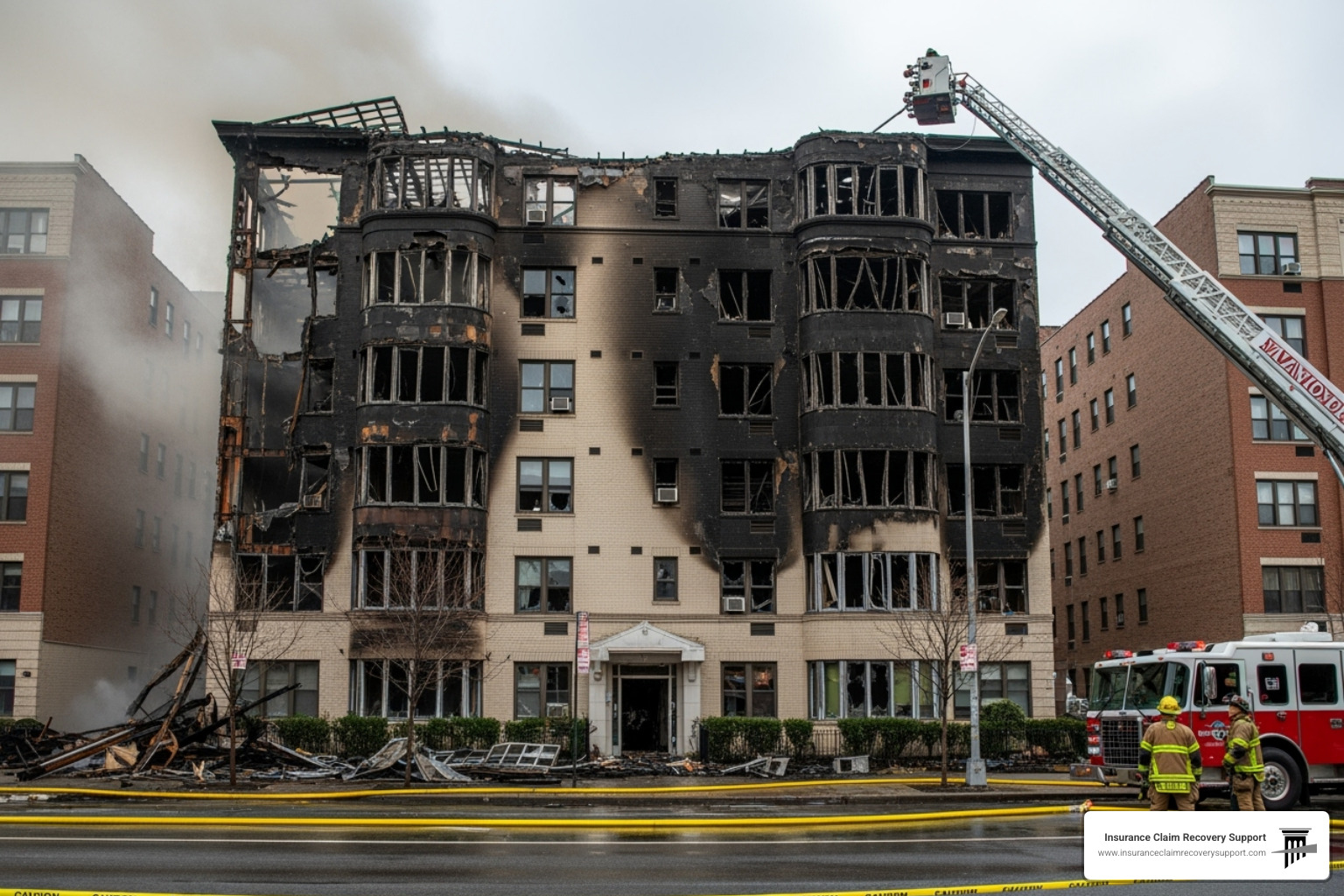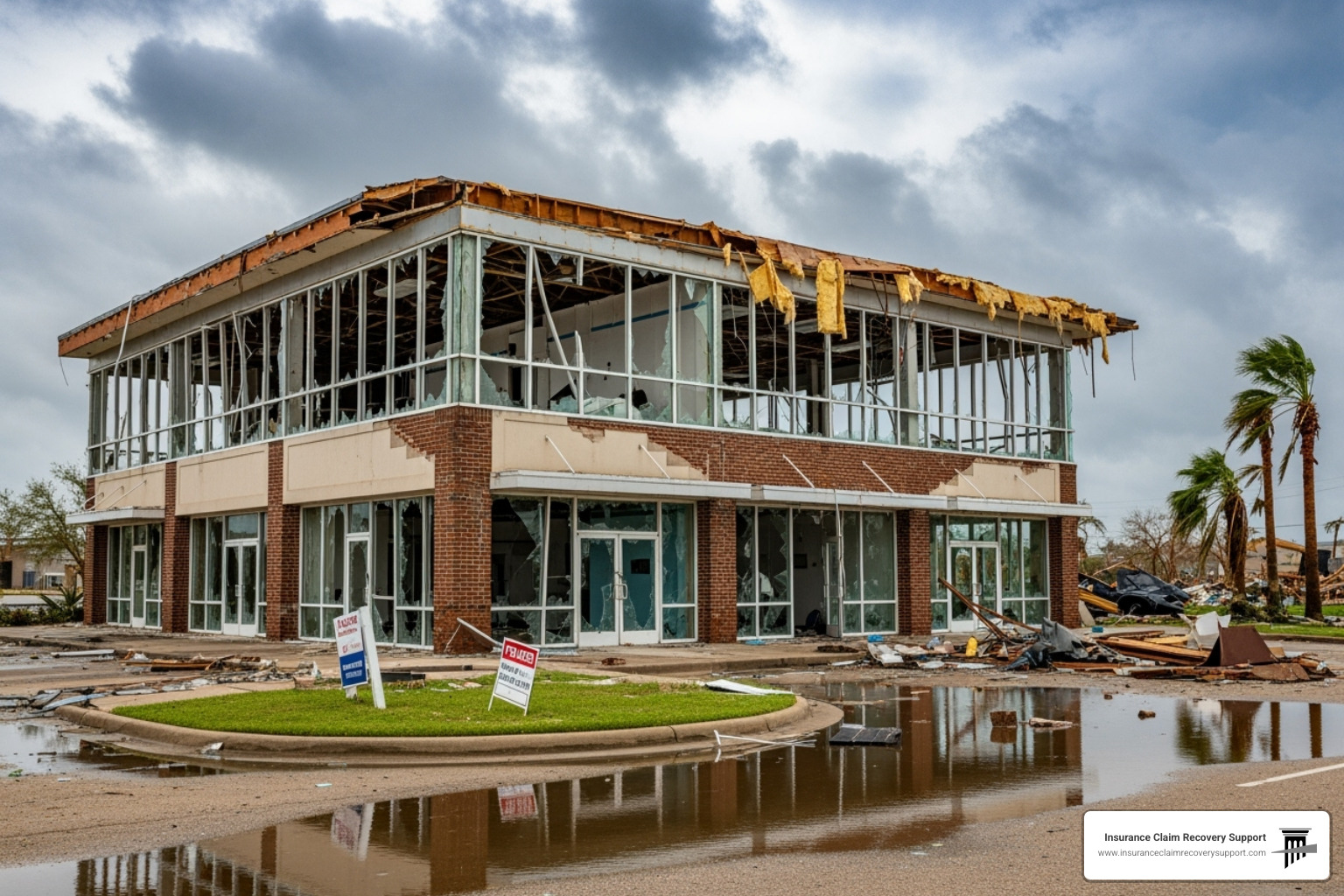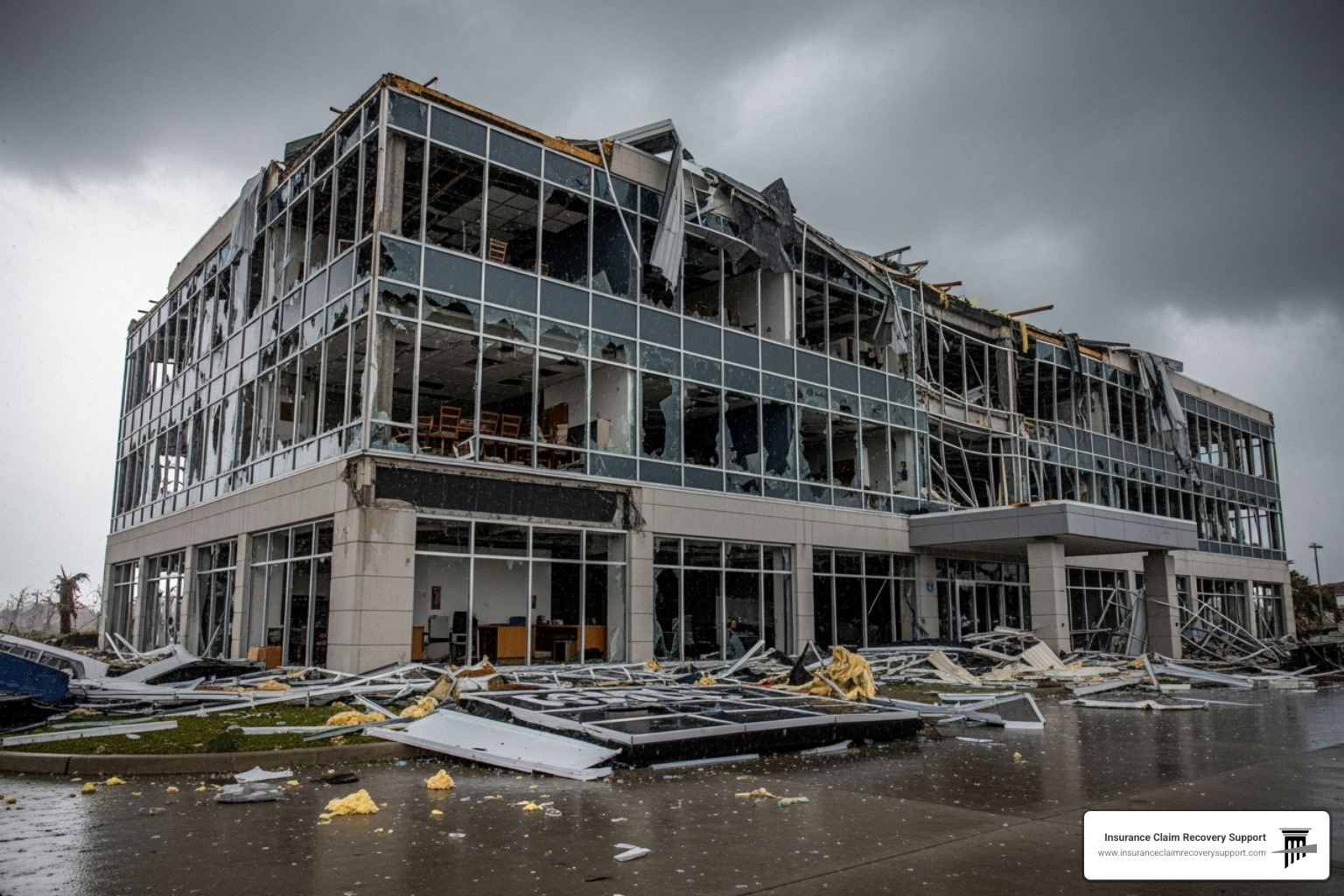What is the average salary for a commercial claims adjuster? Generally, commercial claims adjusters in the United States can expect an average salary of approximately $71,050 per year, though this figure can vary significantly based on factors like location and experience.
The job of a commercial claims adjuster offers remarkable stability within the insurance industry, a sector known for its resilience even during economic downturns. The demand for skilled adjusters remains consistent, driven by the ongoing need for professionals who can carefully assess damages following events like hurricanes, fires, and floods. These adjusters play a pivotal role in ensuring that policyholders receive fair settlements promptly, alleviating the frustration often associated with navigating complex insurance claims.
I’m Scott Friedson, a multi-state licensed public adjuster and CEO of ICRS LLC. Over my career, I’ve settled hundreds of millions in property damage claims, helping policyholders understand what is the average salary for a commercial claims adjuster and advocating for their rights. Let’s dive deeper into the details.
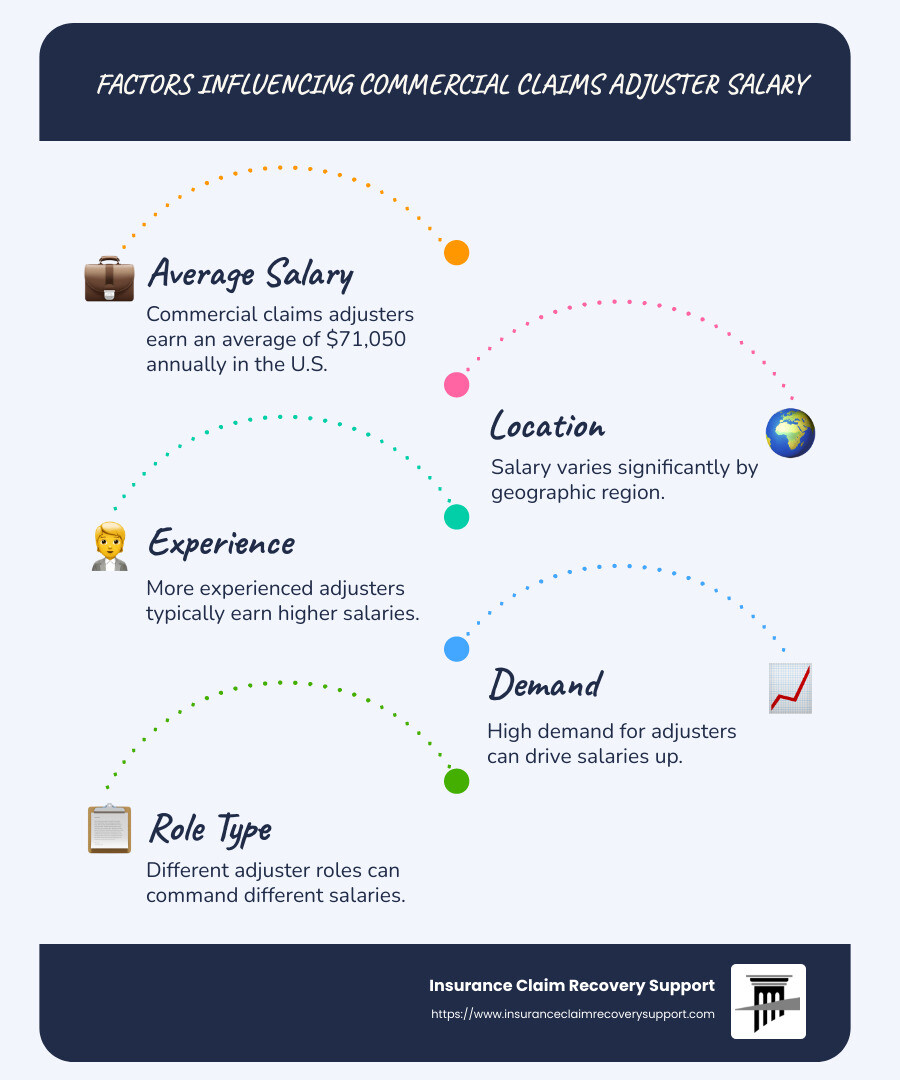
What is the Average Salary for a Commercial Claims Adjuster?
The average salary for a commercial claims adjuster in the U.S. is approximately $71,050 per year. However, this salary can fluctuate based on several factors, including location, experience, and market demand.
Factors Influencing Salary
1. Location
Where you work significantly impacts your earning potential. Adjusters in metropolitan areas, like New York or Los Angeles, often earn more due to the higher cost of living and increased complexity of claims. For instance, adjusters in Texas cities such as Austin or Houston may have different salary expectations compared to those in smaller towns like Amarillo or Lubbock.
2. Experience
Experience plays a crucial role in determining salary. Entry-level adjusters might start with salaries on the lower end of the spectrum, while seasoned professionals can command much higher wages. As adjusters gain experience, they develop expertise in handling complex claims, which often leads to better compensation.
3. Demand
The demand for commercial claims adjusters can vary based on industry needs and economic conditions. In times of natural disasters or economic growth, the demand for adjusters rises, potentially leading to higher salaries. Conversely, during quieter periods, demand might stabilize, impacting salary growth.
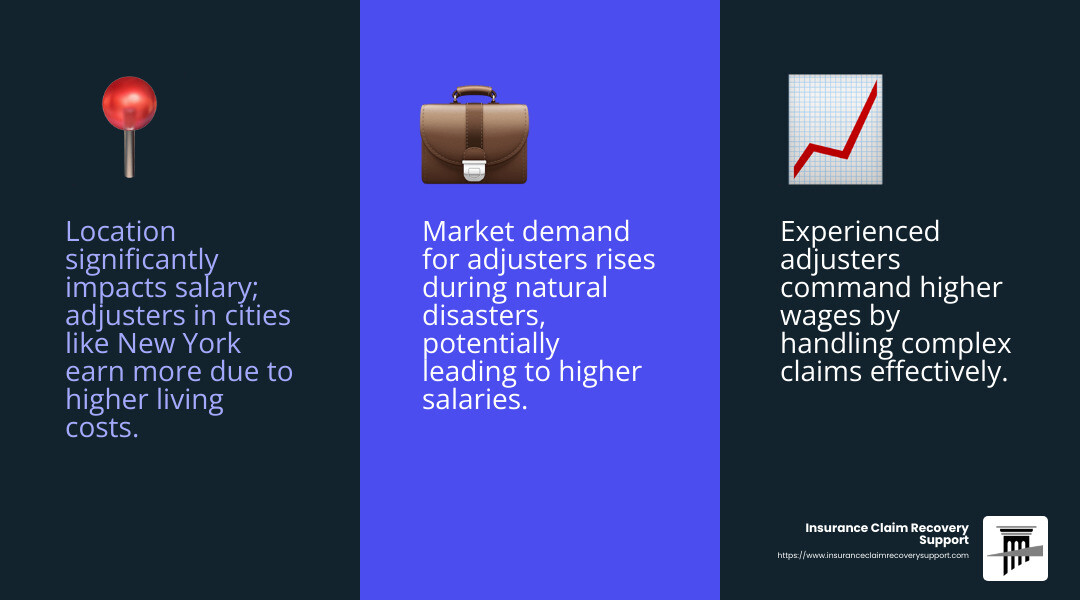
Understanding these factors can help aspiring adjusters plan their careers strategically, ensuring they maximize their earning potential in this stable and rewarding field.
Types of Claims Adjusters and Their Salaries
Claims adjusting is a diverse field with various roles, each offering different earning potentials. Here’s a breakdown of some common types of claims adjusters and what you might expect in terms of salary.
Independent Adjusters
Independent adjusters work on a freelance basis, often handling claims for multiple insurance companies. They have the flexibility to choose their assignments, which can lead to higher earnings. Their income can vary widely, depending on the volume and complexity of claims they handle. Some independent adjusters earn between $50,500 and $100,000 per year, making it a lucrative path for those who prefer autonomy in their work.
Property Claims Adjuster
A property claims adjuster specializes in evaluating damage to buildings and other structures. They are crucial in ensuring fair compensation for policyholders after incidents like fires or storms. The average salary for property claims adjusters is often in line with the general average for commercial claims adjusters, but it can increase with experience and specialization in high-demand areas.
Field Adjuster
Field adjusters are often on the move, visiting sites to assess damage firsthand. This role requires strong analytical skills and the ability to work independently. Field adjusters typically earn a solid salary, with opportunities for overtime during peak periods, such as after natural disasters.
Highest Paying Claims Adjuster Roles
Certain specialized roles within claims adjusting offer higher salaries due to their complexity and required expertise:
-
Damage Inside Adjuster: These professionals focus on assessing internal damages, often dealing with complex claims that require detailed analysis. Their salaries can range significantly, often reaching the higher end of the spectrum due to the expertise required.
-
Damage Recovery Specialist: This role involves working on claims related to recovering damages from responsible parties. Specialists in this area can earn between $50,500 and $100,000 per year, reflecting the skill and knowledge needed to negotiate and resolve these claims effectively.
Understanding these roles and their associated salaries can help guide career decisions for those interested in the claims adjusting field. Each role offers unique challenges and rewards, allowing adjusters to find a path that aligns with their skills and career goals.
How to Become a Commercial Claims Adjuster
Becoming a commercial claims adjuster involves a mix of education, certification, and specific skills. Here’s how you can start and succeed in this career.
Education and Certification
To start, most claims adjusters need at least a high school diploma. However, pursuing an associate’s or bachelor’s degree can give you an edge. Courses in business, finance, or law are particularly helpful.
Certification is crucial. Many states require claims adjusters to be licensed. This often means passing a state exam and completing pre-licensing courses. Continuing education is also important to keep your license current. For example, Florida requires 24 hours of continuing education every two years.
AIC Designation
The Associate in Claims (AIC) designation is a respected credential that can boost your career. It involves a self-study program and exams. The AIC focuses on building technical and negotiation skills, making you more effective in assessing and settling claims.
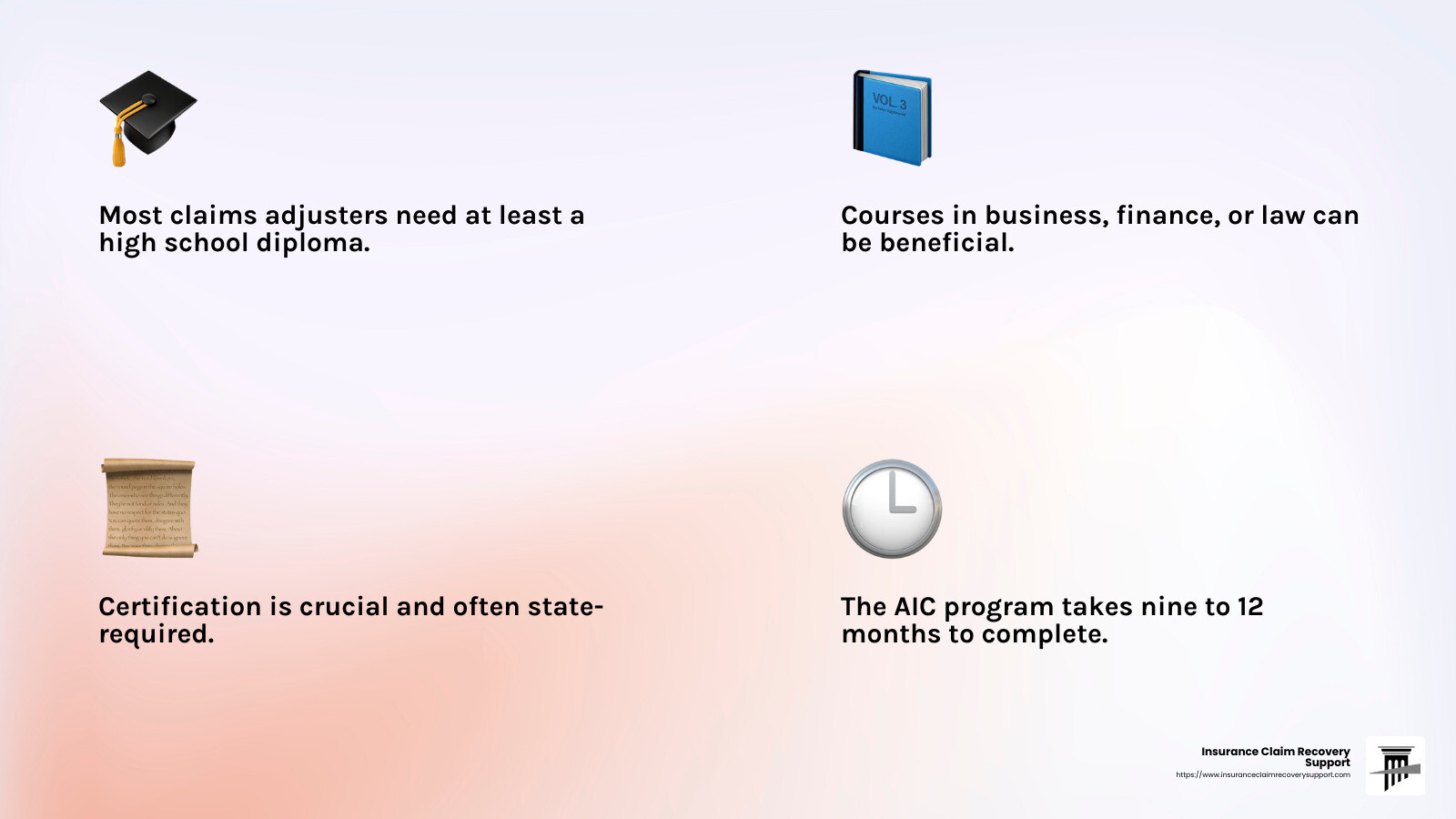
Skills and Responsibilities
A commercial claims adjuster needs a variety of skills. Here are some key responsibilities:
-
Visual Evidence: Gathering visual evidence is vital. This means taking detailed photos and videos of the damage. It helps in creating accurate reports and assessments.
-
Site Visits: Adjusters often visit sites to evaluate damage firsthand. This requires attention to detail and the ability to assess situations quickly and accurately.
-
Incident Reports: Writing clear and concise incident reports is a daily task. These reports document findings and support your recommendations for claims settlements.
Additional Skills
Strong analytical skills are essential. You’ll interpret complex insurance policy language and determine liability. Good communication skills help in interviewing claimants and witnesses, ensuring you gather all necessary information.
By focusing on these areas, you can build a successful career as a commercial claims adjuster. This role not only offers job stability but also the opportunity to make a real impact on people’s lives.
Frequently Asked Questions about Commercial Claims Adjusters
Can You Make Six Figures as a Claims Adjuster?
Yes, it is possible to make six figures as a claims adjuster, particularly in specialized roles. Independent adjusters, who often work on a freelance basis, have the potential to earn more than their salaried counterparts. They are typically paid on a per-claim basis, which can increase earnings, especially during high-demand periods like natural disasters.
However, reaching a six-figure salary often requires a combination of experience, specialization, and a strong track record in decision-making and responsibility. Adjusters who handle complex claims or work in metropolitan areas with higher cost-of-living expenses may also see higher salaries.
What Type of Claims Adjuster Makes the Most Money?
The type of claims adjuster that tends to make the most money includes independent adjusters and those who specialize in high-stakes or complex claims. Independent adjusters have the advantage of setting their own rates and taking on as many claims as they can handle, which can significantly boost their income.
Adjusters working in metropolitan areas often command higher salaries due to the increased complexity and volume of claims. Those specializing in commercial claims or catastrophic events, like hurricanes or large-scale fires, are also likely to earn more due to the complexity and urgency of these cases.
What Does a Commercial Claims Adjuster Do?
A commercial claims adjuster is responsible for evaluating insurance claims filed by businesses. Their duties include conducting site visits to assess damage, gathering evidence, and interviewing witnesses to understand the incident. They must analyze insurance policies to determine coverage and liability.
Adjusters also prepare detailed incident reports and negotiate settlements with policyholders or third parties. Their goal is to ensure claims are processed fairly and efficiently, balancing the needs of the insurance company with those of the claimant. This role requires strong analytical skills, attention to detail, and excellent communication abilities to handle complex insurance claims effectively.
Conclusion
At Insurance Claim Recovery Support, we pride ourselves on being strong advocates for policyholders. Our mission is to ensure that individuals and businesses receive the maximum settlement they deserve. We specialize in handling property damage claims, including those resulting from fire, hurricane, tornado, and other severe weather events.
With our expertise and dedication, we are well-positioned to assist clients across Texas, including major cities like Austin, Dallas, Fort Worth, San Antonio, and Houston. Our deep understanding of Texas’ unique weather patterns and the challenges they present allows us to effectively steer the insurance claim process.
Our Commercial Property Public Insurance Adjusters are committed to guiding you through each step of your claim, ensuring a fair and prompt resolution. By choosing Insurance Claim Recovery Support, you’re partnering with a team that is dedicated to your recovery and well-being.
We stand by our clients, offering exceptional service and unwavering support. Our goal is to make the insurance claims process as smooth and stress-free as possible, allowing you to focus on rebuilding and moving forward.


